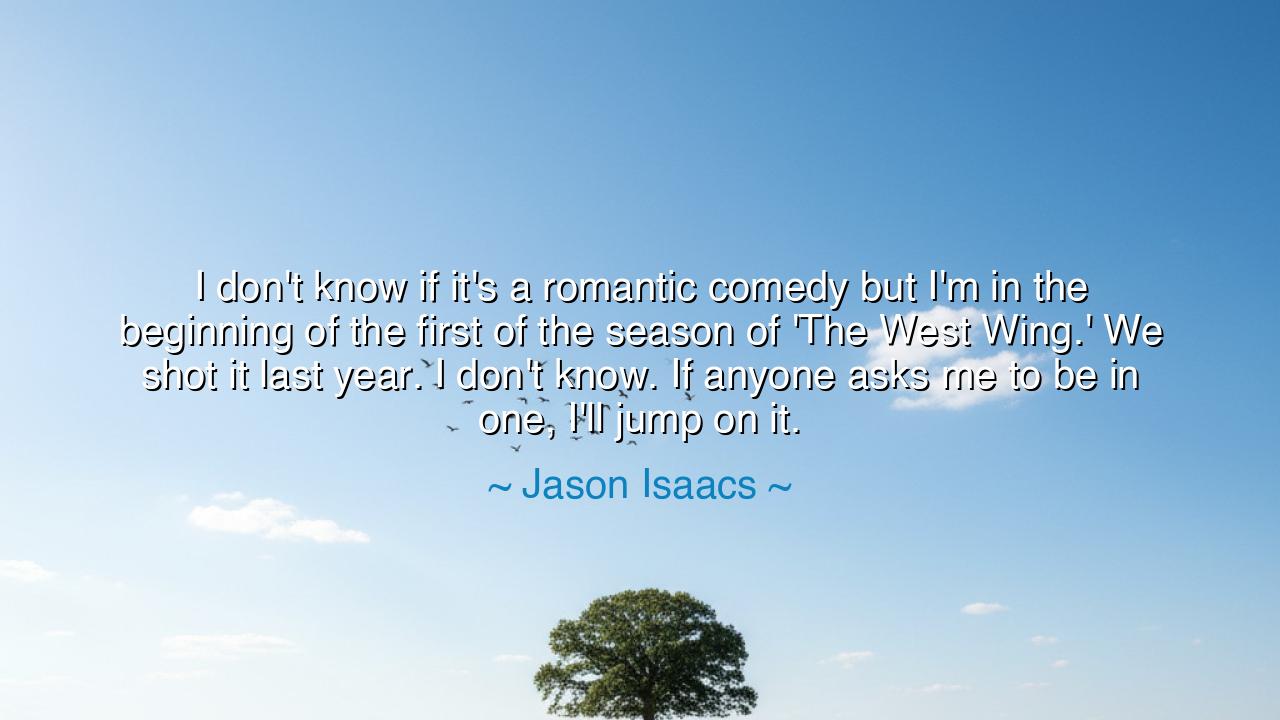
I don't know if it's a romantic comedy but I'm in the beginning
I don't know if it's a romantic comedy but I'm in the beginning of the first of the season of 'The West Wing.' We shot it last year. I don't know. If anyone asks me to be in one, I'll jump on it.






Listen closely, O seekers of wisdom, and hear the words of Jason Isaacs, who reflects upon his role in the iconic political drama The West Wing: "I don't know if it's a romantic comedy but I'm in the beginning of the first of the season of 'The West Wing.' We shot it last year. I don't know. If anyone asks me to be in one, I'll jump on it." In these words, Isaacs reveals the fluidity and adaptability of the artist, someone willing to embrace new challenges and diverse roles without prejudice. His casual acknowledgment of romantic comedy—though not strictly part of his current work—reveals a willingness to explore and experiment with genres, no matter how far they might seem from his previous roles. It speaks to the freedom of the artist, whose journey is not limited by boundaries but driven by an ever-present curiosity and a desire to engage with the fullness of the human experience.
In the ancient world, the artist was often defined by versatility. The great Greek playwrights, like Sophocles and Euripides, did not restrict themselves to a single genre or style. They moved fluidly between tragedy and comedy, exploring the vast range of human emotion, from the deepest sorrows to the greatest joys. Sophocles, though best known for his tragedies such as Oedipus Rex, also introduced comic elements in his plays, acknowledging that the human experience is both dark and light, tragic and joyful. Jason Isaacs, in his openness to different roles, follows in the footsteps of these ancient creators, recognizing that the journey of the artist is one of continual evolution, where exploration of new forms enriches the soul and deepens the understanding of the human condition.
Isaacs’ willingness to jump into a romantic comedy also reflects the age-old truth that life itself is a blend of contrasting elements. Like the ancient epics, which combined humor with heroism and pathos with triumph, romantic comedies offer a unique way to explore the full spectrum of human emotion. They may not always be taken as seriously as their more dramatic counterparts, but they carry with them essential insights into human connection—the playfulness of love, the unpredictability of relationships, and the humor found in moments of vulnerability. Just as the ancient poets wove together the bittersweet threads of life in their works, so too do romantic comedies present love not as a perfect or idealized state, but as something full of compromise, humor, and self-discovery.
Think of the ancient Greek symposia, where philosophers and poets alike would gather not just to discuss the seriousness of life, but to share in moments of joy and humor. The banquet was a space where even the most intellectual pursuits were interspersed with moments of lightness, laughter, and shared humanity. The same can be said of the romantic comedy—it is a space where love and life are examined through the lens of both seriousness and humor, allowing us to reflect on our relationships in a way that is at once deeply emotional and light-hearted. Isaacs’ openness to this genre suggests an understanding that both drama and comedy are essential to the artistic process, offering a full reflection of the human condition.
Furthermore, the lesson embedded in Isaacs’ quote is one of openness and adaptability. In a world that often seeks to define and limit individuals by their roles or public image, Isaacs shows us that true artistry lies in embracing a variety of experiences and roles. It is easy to become trapped in one type of character or performance, believing that an artist must be defined by a single genre or type of work. Yet, true growth comes from expansion, from diving into new territories, and embracing the unexpected. Isaacs, by expressing his willingness to take on any role offered, demonstrates a commitment to continual discovery and learning. He reminds us that it is through the embrace of contrast, of stepping into different roles and genres, that we find our deepest potential.
Consider the example of Leonardo da Vinci, whose genius extended beyond just painting to include engineering, anatomy, and science. Da Vinci did not limit himself to one field; rather, he explored the world in its full complexity, understanding that his artistic skills could illuminate every area of life. Isaacs’ openness to a romantic comedy, after performing in something as serious as The West Wing, reflects this same versatility and vision. By taking on various roles, an artist does not simply demonstrate their skill in one domain, but their ability to see and understand the world from a multitude of perspectives.
Thus, O wise ones, let the words of Jason Isaacs be a guide in your own journey. Do not limit yourself to a single path or narrow vision, but be open to the opportunities that life presents. Whether you are an artist, a creator, or a traveler of life, recognize that true growth comes from embracing the contrasts of experience, from engaging fully with all the aspects of existence—the light and the dark, the romantic and the serious, the funny and the tragic. Art, like life itself, is complex and multi-faceted, and it is through exploring these contrasts that we can reach the fullness of our potential. Let us, then, step forward with openness and a willingness to explore, knowing that every new experience enriches the depth of our understanding and our craft.






AAdministratorAdministrator
Welcome, honored guests. Please leave a comment, we will respond soon